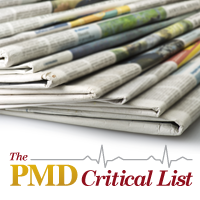- Revenue Cycle Management
- COVID-19
- Reimbursement
- Diabetes Awareness Month
- Risk Management
- Patient Retention
- Staffing
- Medical Economics® 100th Anniversary
- Coding and documentation
- Business of Endocrinology
- Telehealth
- Physicians Financial News
- Cybersecurity
- Cardiovascular Clinical Consult
- Locum Tenens, brought to you by LocumLife®
- Weight Management
- Business of Women's Health
- Practice Efficiency
- Finance and Wealth
- EHRs
- Remote Patient Monitoring
- Sponsored Webinars
- Medical Technology
- Billing and collections
- Acute Pain Management
- Exclusive Content
- Value-based Care
- Business of Pediatrics
- Concierge Medicine 2.0 by Castle Connolly Private Health Partners
- Practice Growth
- Concierge Medicine
- Business of Cardiology
- Implementing the Topcon Ocular Telehealth Platform
- Malpractice
- Influenza
- Sexual Health
- Chronic Conditions
- Technology
- Legal and Policy
- Money
- Opinion
- Vaccines
- Practice Management
- Patient Relations
- Careers
The PMD Critical List: Median Compensation for Physician Leaders Increases to $350,000
Physicians in leadership positions experienced an 8% compensation increase from 2013 to 2016. That story tops this week’s PMD Critical List.

Physicians in leadership positions experienced an 8% compensation increase from 2013 to 2016. That story tops this week’s PMD Critical List. Also making the list: Is this the best doctor movie ever? Also, Americans are spending more money on pets’ healthcare and most physicians aren’t trained to treat physicians.
• New Physician Leadership Compensation Survey (PR Newswire)
According to the biennial Physician Leadership Compensation Survey, total median compensation for physicians in leadership positions in 2016 is $350,000, a three-year gain of 8% since the last survey in 2013. The highest-paid physician executives, on average, earned $499,000.
• Nation’s Hospitals Improving on Safety (Consumer Affairs)
Not all hospitals are alike and some have much better safety records than others. In the latest Leapfrog Hospital Safety Grade, which judged 2,633 hospitals and assigned letter grades, 844 earned an "A," 658 earned a "B," 954 earned a "C," 157 earned a "D," and 20 earned an "F."
• The Best Doctor Movie Ever (Crave)
“Stories about doctors abound through literature, cinema, and the rest of popular culture. It’s a job on which we all rely, but about which many of us harbor intense anxieties. Doctor Strange is just the latest in a very long line of films about the medical profession. A panel of film critics each pick only one film that represents the pinnacle of the subgenre.”
• Doctors Working on “Webside Manner” (Fortune)
“Why go to the doctor, when you can just Skype or text her/him? That may sound glib, but these days, it’s a serious question. And in a field where many trends—skyrocketing drug prices and healthcare costs—tend to defy logic, the rise of telemedicine is one that makes a lot of sense.”
• Physicians Call Daylight Saving Time a Health Burden (Medill Reports Chicago)
Bad clock work? “Though the costs and benefits of DST are still hotly debated, many US doctors and researchers agree that disrupting our sleep cycles during DST can throw people into a short-term spiral of adverse health effects.”
• Americans Spending More on Pet’s Healthcare (Washington Post)
It’s not just people. “Pets—they’re just like us! Or, at least, we Americans try mighty hard to make them so. Another aspect of life we share with our animals? Rising spending on health care, according to a recent working paper from the National Bureau of Economic Research.”
• Combine Procedures to Limit Children’s Anesthesia Exposure (Science Daily)
“Children who require both dental and non-dental medical procedures should have them completed under one general anesthesia session whenever possible, which is ideal for both the patient and family,” suggests new research from the American Society of Anesthesiologists.
• Who Will Decide the Next President? Not Physicians (Time)
The 2016 US presidential race is in the home stretch, and “despite the government’s huge influence on health care, doctors vote 9% less than the general population. And physicians are 22% less likely to cast ballots than lawyers, another group of highly educated professionals.”
• Physicians' Participation in Obamacare Plummets 20% (Media Research Center)
“The number of physicians who accept health insurance plans offered on Obamacare’s federal and state marketplaces has plummeted nearly 20 percentage points, creating yet another crack in the president's rapidly buckling health care law,” according to a recent survey by SERMO, a social network for physicians.
• Physician Salaries On the Rise (Physician’s News Digest)
“Despite the looming physician shortage, physician salaries increased just 2.5% from 2015 to 2016, according to a new survey by Health eCareers. America’s physicians and surgeons report an average salary of $255,648 a year, although that amount varies from state to state. Cardiologists topped the list at $355,628 a year.
• Most Physicians Untrained to Handle Veterans (The Times-Tribune)
“Most veterans get some health care from private doctors. But most doctors outside the Veterans Affairs system aren’t trained to identify service-related illness, according to a New York physician working to educate clinicians on the issues.”
• The Employed Physician: A Staff Appointment Does Not Equal Job Security (The Legal Intelligencer)
“Perhaps the two most important documents in the career of a young physician will be his/her medical degree and employment contract. Yet physicians are often unaware of the inherent traps that pose two significant risks: lack of job security and unwarranted reports to the National Practitioner Data Bank.”
